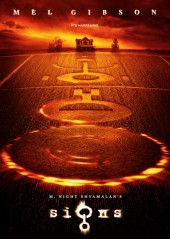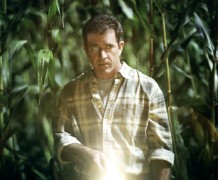|
Signs
|
| |
 |
USA, 2002. Rated PG-13. 106 minutes.
Cast:
Mel Gibson, Joaquin Phoenix, Rory Culkin, Abigail Breslin, Cherry Jones,
Patricia Kalember, M. Night Shyamalan
Writer: M. Night Shyamalan
Music: James Newton Howard
Cinematographer: Tak Fujimoto
Producers: Frank Marshall, Sam Mercer, M. Night Shyamalan
Director: M. Night Shyamalan
LINKS
|
 .
Night Shyamalan's distinctive filmmaking and storytelling talent is the ability
to take a shopworn concept--perhaps even a stupid one--and make it real. What
if our most popular tales, no matter how tall, are commonplace precisely because
they are founded in something true? What if there is no such thing as a completely
fictional story? What if, as Signs postulates, there are no coincidences?
.
Night Shyamalan's distinctive filmmaking and storytelling talent is the ability
to take a shopworn concept--perhaps even a stupid one--and make it real. What
if our most popular tales, no matter how tall, are commonplace precisely because
they are founded in something true? What if there is no such thing as a completely
fictional story? What if, as Signs postulates, there are no coincidences?
Ghost stories are ubiquitous. Every culture has them, but for most people in
the contemporary world, the idea of ghosts walking around is ludicrous. But
what if ghosts really do exist--not in some alternate fantasy world, or in legends,
or in the minds of clearly flaky people--but in our own world? Shyamalan explored
that question with The Sixth Sense, creating a film that is as dramatic
as it is thrilling.
Aren't most comic books preposterous, even by comparison to ghost stories,
and mostly just escapism for teenage boys? Not for Shyamalan. What if superheroes
weren't conceived out of adolescent fantasies? What if, once in awhile, someone
different really is born? Shyamalan took that one supposedly ridiculous idea
and inserted it into the real world, making Unbreakable.
In Signs, Shyamalan asks, what if all those absurd stories about green
men from outer space descending onto trailer parks with their anal probes (or
whatever) weren't quite so absurd?
A rough way to describe Signs is as Shyamalan does War of the Worlds.
But don't worry about re-experiencing the bombast and jingoism of Independence
Day. This is Shyamalan, who grounds the film by telling his story from the
point of view of a single Pennsylvania family. The audience never experiences
anything the family does not experience; events in the larger world are restricted
to the television and the radio.
Despite the presence of aliens, Signs is no more a science fiction movie
than it is an action movie. If it were a science fiction movie, it wouldn't
be a good one. Though intriguing, the premise functions as exactly that, a sliver-thin
"What would happen if…" premise, not as a launching point for an exploration
of the future of science and humanity. From that perspective, explanations are
not terribly complete or satisfying.
The quality of the science fiction is beside the point. Signs is best
viewed as another creepy Shymalan supernatural drama infused with more pure,
unadulterated terror than its two predecessors. The emotion and drama Shyamalan
produces is painstakingly truthful once the seemingly absurd is introduced.
The patriarch of the family at the center of Signs is the ex-Reverend
Graham Hess (Mel Gibson), who gave up the collar and the cloth after the accidental
death of his wife soured him on God. He has two young children, Morgan (Rory,
one of the army of Culkins) and Bo (Abigail Breslin), and his brother Merrill
(Joaquin Phoenix) lives with them. There are almost no other characters to speak
of, only policewoman Caroline Paski (Cherry Jones) and Shyamalan himself, not
the most dynamic actor, in a tiny but critical role.
The cleric who has lost his faith is a film cliché, but Shyamalan and Gibson
make the character work--Shyamalan with his attentiveness in developing credible
familial relationships and Gibson with one of his finest performances. Gibson
displays impressive range, even crying and showing fear without eliciting a
response of, "Hey, look at Mel Gibson crying! Weird." The touching dinner that
the family suspects is its last supper together is an emotional high point.
Signs proceeds along two tracks, the what-the-hell-is-happening track
and the crisis-of-faith track. There are two kinds of people in the world, Graham
tells Merrill when Merrill seeks comfort, those people believe that Somebody
is looking out for them and thus meet the unknown with faith and hope, and those
who believe they are fundamentally alone, and meet the unknown with fear. Graham
himself has become one of the latter group, yet others naturally gravitate to
him for counsel and guidance, despite his protestations.
Though there is no Big Twist in Signs, which some have come to expect
of Shyamalan, the two tracks join together at the end in an unusual way, one
that is emotionally satisfying even though the what-the-hell-is-happening issue
is not fully fleshed out. The ending is even more satisfying if you regard the
aliens not necessarily as extraterrestrial life, but as demons, and the whole
film as a Biblical tale.
Stylistically, Signs is not a departure for Shyamalan, but more of the
same. The film's patience, stillness, and washed-out colors allow events to
creep up on the audience. The climax would have been a disaster in the hands
of any other director. Some say that Shyamalan is proving to be one-dimensional
filmmaker, capable of only one kind of story and style. They may be right. Shyamalan
does not seem interested in making any kind of film other than the ones he's
making. Going to see a Shyamalan movie is becoming an either-you-dig-Shyamalan-or-you-don't
proposition. If you dig him, however, you're not likely to get tired of him
anytime soon.
Review
© August 2002 by AboutFilm.Com and the author.
Images © 2002 Touchstone Pictures. All Rights Reserved.


